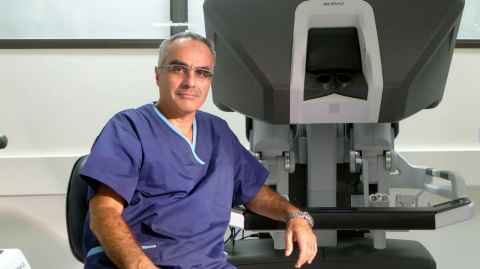Māori almost twice as likely to die after bowel cancer surgery
19 August 2025
Post-operative surgery complications not picked up quickly enough in Māori patients have led to higher death rates than in Pākehā.

Māori are almost twice as likely as Pākehā to die from complications following bowel cancer surgery, new research shows.
The study, just published in the British Journal of Surgery, found that Māori patients having bowel or gut cancer surgery were slightly more likely to experience complications, such as infections, bleeding, or organ failure.
However, the more concerning finding was that Māori were significantly less likely than Pākehā patients to survive those complications.
“That tells us something is going wrong with how our hospital systems respond to Māori patients with problems after surgery,” says lead author Dr Cameron Wells, a doctoral candidate in surgery at Waipapa Taumata Rau, University of Auckland.
“It’s not just whether complications happen, but how quickly and effectively they’re picked up and treated. Our study shows that for Māori patients, those crucial steps often come too late,” says Wells.
The research team included Māori and Pākehā doctors from several hospitals and the universities of Otago and Auckland. They analysed hospital records and data from the New Zealand Cancer Registry for more than 31,000 patients between 2005 and 2020.
During this period, hospital teams improved at identifying and treating complications in Pākehā patients, with deaths approximately halving. However, survival rates for Māori showed negligible improvement, widening the mortality gap over the 16 years.
“This is very concerning and confronting data,” says Wells.
It’s not just whether complications happen, but how quickly and effectively they’re picked up and treated. Our study shows that for Māori patients, those crucial steps often come too late.
The study points to structural racism in the healthcare system, unconscious bias, and poor communication as key contributors to the disparity. It highlights that Māori patients with early symptoms of complications may be taken less seriously, causing harmful delays in diagnosis and treatment.
Dr Jonathan Koea (Ngāti Mutunga, Ngāti Tama), a professor of surgery in the Faculty of Medical and Health Sciences at Waipapa Taumata Rau, University of Auckland, says this study builds on earlier research.
A 2023 paper, also led by Wells, found Māori are proportionally more likely to be treated at hospitals with higher rates of post-surgical deaths. These hospitals often have fewer resources to recognise and respond to complications after surgery. (See Annals of Surgery ‘Failure to rescue following colorectal cancer resection’.)
Koea also referenced earlier research he was involved with, led by University of Otago Māori epidemiologist Professor Jason Gurney, which found Māori were more likely to die after elective surgery than Pākehā. Contributing factors included communication issues and assumptions about health literacy. (See NZMJ 17 September 2021)
“This latest study is complex, because it’s about something that doesn’t happen, a patient’s life is not saved when they experience a complication, which makes it hard to measure,” Koea says.
“The research sits within the broader context of the Māori patient journey with cancer. From the outset, Māori are less likely to be screened, less likely to have a GP, more likely to require emergency surgery, and less likely to be referred to an oncologist.
“It’s a pattern of multiple slippage points, which is why Māori are more likely to die six or seven years earlier than Pākehā,” Koea says. “Māori are more likely to experience complications and less likely to be rescued. It aligns with what we already know.
“It shows that treating everyone equally results in unequal outcomes – you have to treat Māori differently to achieve the same outcomes.”

Māori are more likely to experience complications and less likely to be rescued... Treating everyone equally results in unequal – you have to treat Māori differently to achieve the same outcomes.
Recommendations for improvements
The paper recommends identifying and removing barriers to equitable care by embedding cultural safety and anti-racism training for all clinical staff to improve post-surgical outcomes.
Strengthening Māori-led models of care and incorporating whānau perspectives into surgical pathways may also improve trust, responsiveness, and outcomes.
Wells says the next step is to move from research describing inequities to actually doing something about them.
“We already know where many of the problems lie – the focus now must be on partnering with Māori communities to co-design solutions. That means listening, acting, and making sure the health system delivers care that is culturally safe, equitable, and accountable,” Wells says.
There are a range of initiatives under way across New Zealand, he adds.
“One initiative I think has potential is called Kōrero Mai, which enables patients and their families to speak up and request a review by more senior staff in hospital when they are worried about something going wrong.
“We know that for Māori patients, there are significant cultural barriers – this is a broader issue, not limited to surgery.”
While hospitals are taking steps to improve monitoring and treatment after surgery, this research suggests current efforts are benefiting some patients but not others.
“We need to be very careful about what we do next, because the gap is getting wider.”
The research was funded by a Clinical Research Training Fellowship awarded to Dr Cameron Wells by the Health Research Council of New Zealand.
Media enquiries
Email: mediateam@auckland.ac.nz